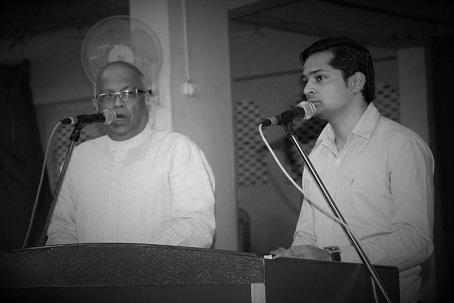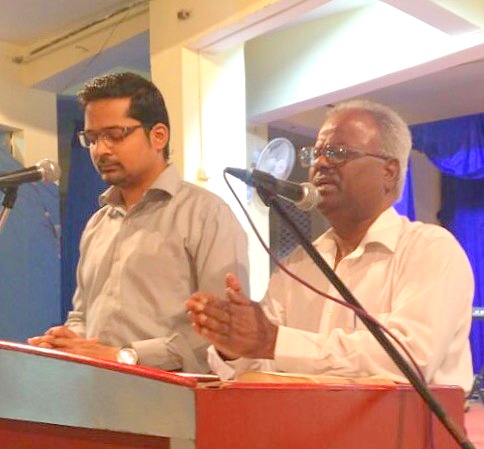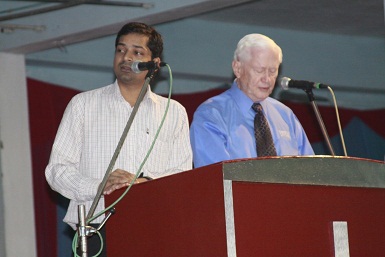A lot of people, in Christendom, tend to define salvation as something that is to do with one's deliverance from the bondage of sin and ticket to the heaven's entrance. Undoubtedly, this is the best short definition available of salvation. Bible even goes on to say that those who take the name of Jesus Christ shall be saved. We can't build the doctrine of salvation based on one or two verses of the bible. Every verse of the bible is true but to develop an overall understanding we need to read bible as a whole not just one verse.
Therefore, looking at the biblical explanation of the concept of salvation in it's entirety gives us the larger picture of salvation. Because this gives us the answer to various questions, like; have we been already saved? Are we being saved ? Are we yet to be saved? Is our salvation incomplete? What is like to be saved? Can we loose our salvation? Do we have to work for our salvation? And many more questions in and around salvation tend to emerge as one tries to dig deep in the concept.
There are many opinions to this problem which are already available, however, here I would like to talk of salvation not as something which is already done but as something which is still in the process. So the first place to understand this larger picture of salvation and solve such problems is to look at salvation as a process and understand what all segments this process includes. And this larger picture incorporates various verses from the scripture to build the divisions and, in some cases, subdivisions of salvation.
Attempting to boil down this concept of salvation with least complexity yet entirety leaves us with three segments in the process: justification, sanctification and glorification.
1. Justification: the word justification, in the context of salvation, refers to man's right standing before God. Sin had marred man's image and caused him his just position before God Which man would never have been able to retain without the help of God himself. Consequently, God being the source of solution, sent His Son Jesus Christ to make propitiation for sin and die in the place of guilty man and his standing right before God. Man had no part in this segment to make himself justified except to make a simple response by putting faith in Christ's atoning work as a sign of acceptance of God's gift of salvation. God delivered us from the penalty of sin; that is eternal death. Interestingly, religiously speaking, this is the only thing that separates Christianity from soteriology of other faith-systems. In Christianity, it's God reaching man (objective work of salvation) but in other faith man teaching God. (Romans 5:1, Ephesians 2:8-9, Romans 3:28 Galatians 2:16, Romans 4:1-25, Galatians 2:21)
2. Sanctification: the word sanctification, in bible, refers to the process of purifying oneself from world and sin. Now Christ's work is over with the justification and our work begins with sanctification which is done through the help of Holy Spirit and Word of God. Though Christ has from the penalty of sin, the power of sin still exists in our existence and we are to overcome it by yielding ourselves to Holy Spirit and embodying scriptures which is called, in Pauline corpus, flesh-spirit struggle. The key purpose Jesus sent the helper after His ascension was to help us in the process of sanctification; Holy Spirit convicts us of our sin (John 16) and word of God sanctifies is (John 17). Theologically, this is how our human agency comes in activation by the use of human free-will to purge oneself from the power of sin which is the subjective work of salvation. Paul and James, both says work out your salvation and keep yourself un-spotted from the world which is the true religion. (John 17:17, 1 Thessalonians 5:23 Romans 12:1-2, 1 Thessalonians 4:3, 1 Corinthians 6:11, Romans 8:9-11, Romans 15:15-16, 1 Corinthians 12:13, 2 Thessalonians 2:13)
3. Glorification: glorification refers to an event in the time of Christ's return when believers will inherit glorious/heavenly body and will completely be freed from the presence of sin. This time is not known to any man but will only be for the ones who have completed the above mentioned two (justification and sanctification) process of salvation. This is where man will not only be freed from the penalty, power but also from the presence sin. (Romans 8:30, Philippians 3:21, 1 John 3:2-4, 1 Corinthians 15:51-54, 1 Corinthians 6:11, Romans 8:17)
This BRIEF analysis sums up the biblical doctrine of salvation which is very complex in nature but quite significant for believers' understanding. The objective work of salvation proves God's omniscience and sovereignty as He initiates the work of salvation and the subjective work of salvation without violating privileges human free will to partake in the divine work of salvation. Such knowledge/information must overwhelm our heart with joy and worship.
Source: A sermon preached by blogger at a convention in Jammu & Kashim 23, 24 March 2017





















